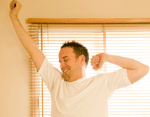Acupuncture
Acupuncture is thought to be beneficial to some people as a way of reducing stress and dealing with the effects of bruxism.
Alcohol
Many experts link the consumption of alcohol as a trigger for bruxism, especially before going to bed.
Amitriptyline Hydrochlorine
Some bruxism sufferers report relief from the condition when taking this sedative.
Anger
Research suggests that suppressed anger can trigger bruxism.
Anti-Depressants
Small doses of anti-depressants can sometimes be used as part of a bruxism treatment program.
Autism
Bruxism is common in patients with autism. Treatment is challenging because autism patients will often have severe dental phobia and can become anxious by the bright lights and loud instruments in a dental surgery The UK government is currently formulating an `autism strategy` that will require healthcare professionals, including dentists to treat autism patients.
Awareness
Bruxism is not well recognised or treated by the majority of dentists in the UK* However, there is evidence to suggest that this is changing quickly. 2010 will see the first ever `bruxism awareness week` which is sponsored by a company that makes plastic mouth guards for supply to dentists. These guards can cost the bruxism patient up to £700 to have made and fitted. *source
Bio-Feedback
Biofeedback devices are sometimes used to help overcome bruxism. However, they are thought to have limited success.
Bite Guard
Also known as dental guard, mouth guard or occlusal splint. One of the most common ways of protecting teeth from bruxism. The most popular guard in the US is the SleepRight dental guard.
Bitestrip
Small device, worn at night to identify the occurrence of sleep bruxism. The device can only be used once, but is a low cost alternative to a full sleep study. Available in the UK.
Botox
Early stage research suggests that Botox may be a treatment option for bruxism sufferers
British Dental Health Foundation (BDHF)
The BDHF is an independent charity that works to improve the standards of oral healthcare - both here in the UK and around the world.
Bruxism
The unconscious act of clenching and grinding teeth.
Caffeine
Consumption of caffeine is thought to increase the risk of bruxism
Clonazepam
Clonazepam is a Muscle relaxant drug prescribed in some countries as a treatment for bruxism. Recently (June2010) it was approved by the UK Medical Health Regulatory Authority as a prescribed drug for UK patients.
Cocaine
Cocaine users frequently suffer from bruxism, commonly giving rise to pain in the temporo mandibular joint and masticator muscles.
Dental Erosion
Dental erosion is defined by the World Health Organization as "the progressive irreversible loss of dental hard tissue that is chemically etched away from the tooth surface by extrinsic and/or intrinsic acids by a process that does not involve bacteria" Dental erosion is common in patients with bruxism.
Dental Implant Failure
People with bruxism may not be the ideal candidate for dental implants because the risk of implant failure is higher. Chomping teeth can loosen teeth and damage cosmetic dental work, especially in the early treatment stages.
Earache
Pain in the jaw or TMJ caused by bruxism can often be misdiagnosed as earache.
Headache
Early morning headaches are a common side effect of bruxism.
Hypnotherapy
Hypnotherapy is a well documented approach to dealing with bruxism. It works by inducing a relaxed state of mind and awareness of teeth grinding, followed by suggestions as to how to deal with the underlying causes.
Lips Together, Teeth Apart
Philosophy to increase awareness of bruxism, to be practiced just before going to bed.
Malocclusion
Irregularities in the way that the top and bottom teeth fit together. Some dentists believe that this is the predominant cause of bruxism. However, the number holding this view is reducing. Stress is thought to be the most common cause.
Menieres disease
Symptoms associated with this disease include TMJ
Mouth guard
Generic term for a device to protect teeth from clenching and grinding (bruxism). Usually worn at night, a mouth guard acts as a physical barrier between the teeth. Often worn at night whilst sleeping and used in conjunction with muscle relaxant or anti anxiety medication.
Musicians
Musicians are reported to be more at risk of developing bruxism than the general population. Studies published in the BMJ report that 73% of violinists grind their teeth.
Nocturnal Bruxism
The unconscious act of clenching and grinding of teeth at night.
Post Traumatic Stress Disorder
Several reports make the connection between bruxism and PTSD.
Stress
Regarded by most experts as the most common cause of bruxism.
Temporo mandibular Joint Disorder (TMD)
The Temporo Mandibular Joint (TMJ) is a complex joint that connects the jaw to the skull. Some experts believe that bruxism is caused by a misalignment of the jaw which can lead to TMD and other symptoms such as migraine- like headaches and facial pain.
Vitamins
Vitamin impairment reported, as a consequence of bruxism, but the exact mechanism by which this occurs is unclear.
